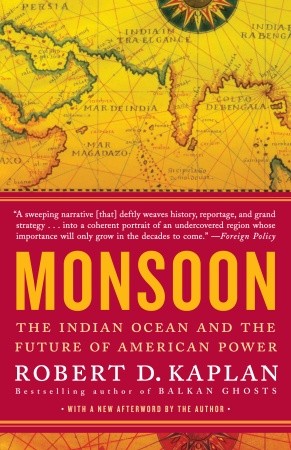I am fascinated by connections and so Robert Kaplan is one of my favorite authors. His book “Monsoon” and an older book called “The Ends of the Earth” should be must reading for missionaries, and anyone interested in the evangelization of the world and Christianity confronting Islam. It is important for us to understand in mercy work as well. Kaplan predicted the rise of the “Muslim Brotherhood” and the downfall of strong man regimes in the near East many years ago and the prediction was made on the basis of their ability to render aid and help in times of crisis. I remember thinking during the so called “Arab Spring” and the downfall of Libyian, Egyptian, and other “strong men” that the obvious joy in the West needed to be tempered by the fact that those filling the void would most likely be extremely militant Islamists.
Kaplan talks about the reasons that Islam is predominent from the Arabian Sea, around the Bay of Bengal and the Indian Ocean out to the Islands of Indonesia which is the largest Muslim country in the world. The monsoon winds blow back and forth like clockwork making trade relatively easy and Arab traders made the most of it. So did Europeans like the Dutch who became a world power because of their sea going prowess. Yet their missionaries made no headway among indigenous people like Islamist and Catholics did because as Kaplan says in a sound bite answer that I paraphrase here, “they were too caught up in theological battles that were waging in Europe to make any difference in the lives of the people around them”. 1.
Jump ahead to an email I received that asked the question, “why don’t people go to church anymore?” and I am sorry I don’t have the reference.
Most people don’t experience God at church. They’re not looking for the “deep” theological trivia that seems to interest some preachers. They crave something very simple. They’re dying to be reassured that God is real, that he is more than a historical figure, that he is present today, and that he is active in the lives of people around them.
Those of us who remain in this imperfect gathering of the faithful need to stop talking and “teaching” long enough to listen to the majority outside our walls. I’m not suggesting their views are flawless. Or that we should design ministry merely according to consumer whims. But we do need to keep our ultimate goal in mind—to help bring others into a closer relationship with Jesus Christ. That’s what defined the ministry of Jesus himself. He boldly broke away from the habits and routines of the religious elite of the time. And he fashioned a highly relational ministry that connected with the disenfranchised.
Interest in deep theological trivia sounds Sounds kind of “dutch” doesn’t it. I know this will make some extremely unhappy but it bears thinking about.
1. “The Calvinists also sent out few missionaries compared to the Roman Catholics, preoccupied as they were with religious disputes within Europe. Calvinism simply made little impression on the peoples of the East once the support of the East India Company was dropped.’ Robert Kaplan, “Monsoon” , RAndom House 2011 – Page 285


